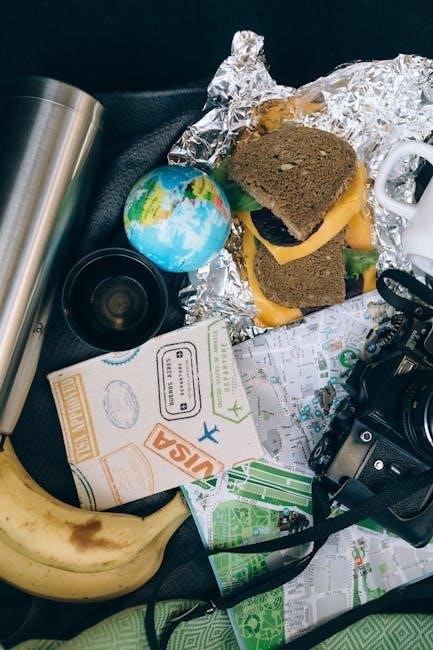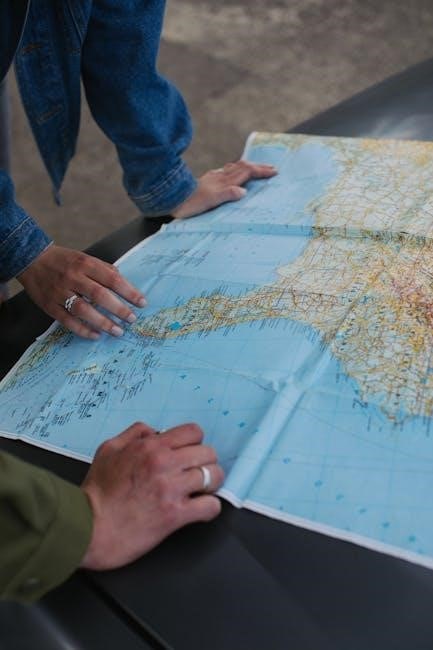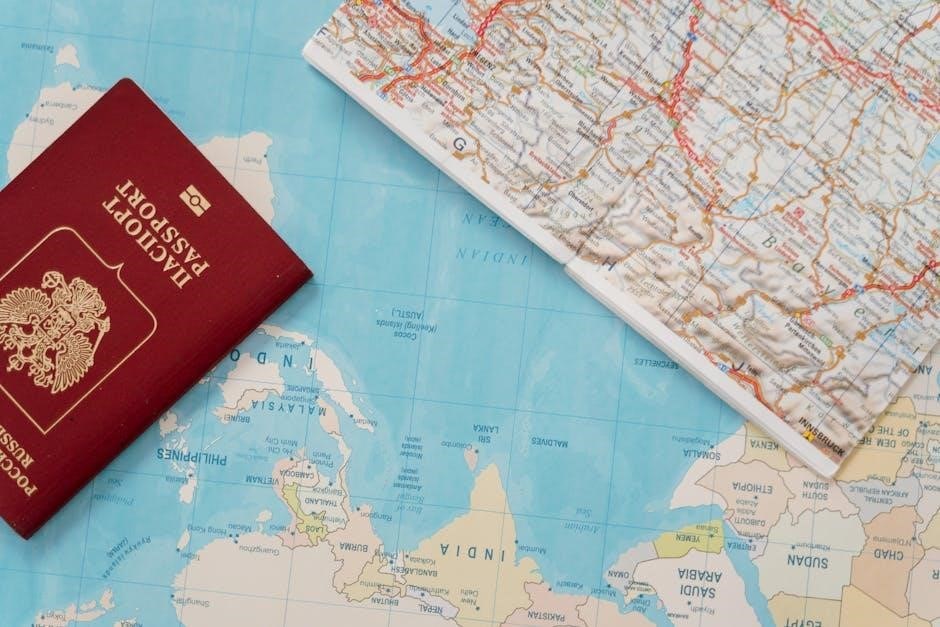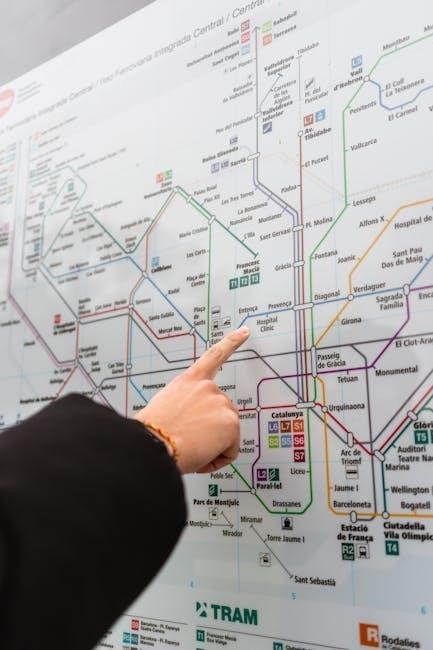
Budgeting and Saving Strategies
Start by prioritizing expenses and tracking spending to allocate funds wisely. Use budgeting apps to monitor daily costs and identify areas for reduction. Increase income through side jobs or freelancing to build a travel fund gradually. Implement strict savings strategies, such as automating deposits into a dedicated travel account. Avoid unnecessary purchases and focus on long-term goals to ensure steady progress toward affordable travel.
1.1 How to Create a Realistic Travel Budget
To create a realistic travel budget, start by assessing your income and necessary expenses. Allocate a portion of your remaining funds specifically for travel. Use budgeting apps to track your spending habits and identify areas where you can cut back. Set clear financial goals and break them down into monthly savings targets. Prioritize needs over wants to ensure steady progress. Regularly review and adjust your budget to stay on track and avoid financial strain during your travels.
1.2 Ways to Save Money for Travel
Start by identifying areas to reduce daily expenses, such as cooking at home or canceling subscriptions. Consider side gigs or freelancing to boost income. Sell unused items to generate quick cash. Automate savings by setting up monthly transfers to a dedicated travel fund. Take advantage of travel rewards from credit cards or sign up for cashback apps. Prioritize frugal living and avoid impulse purchases to maximize savings. Consistency is key to building a travel fund over time.
1.3 Using Budgeting Apps to Track Expenses
Budgeting apps like Mint, You Need A Budget (YNAB), and Spendee help monitor daily spending, ensuring every dollar is accounted for. These tools categorize expenses, making it easier to identify areas for reduction. Set budget goals and receive alerts when nearing spending limits. Tracking expenses in real-time helps maintain financial discipline. By staying informed, travelers can allocate funds more effectively, ensuring savings grow steadily for upcoming trips. Consistent use of these apps fosters better financial habits, crucial for affordable travel.

Finding Affordable Transportation
Research affordable options like budget airlines, public transport, and carpooling. Book flights in advance, compare prices, and consider off-peak travel for significant savings. Use apps to find cheap tickets and plan routes efficiently, ensuring cost-effective journeys without compromising comfort.
2.1 How to Find Cheap Flights
To find cheap flights, compare prices using tools like Skyscanner or Google Flights. Enable price alerts for fare drops and book in advance. Be flexible with dates, opting for off-peak times or mid-week flights. Consider alternative airports and budget airlines, but check for hidden fees. Clearing cookies can prevent price hikes, and booking round-trip tickets often saves money. Lastly, sign up for airline newsletters for exclusive deals and discounts to secure affordable travel options.
2.2 Budget-Friendly Options for Ground Transportation
Opt for public transit like buses or trains, which are cost-effective and widely available. Walking or biking is free and ideal for shorter distances. Consider carpooling or ridesharing apps to split costs. Renting a vehicle with others can reduce expenses, while hitchhiking is a free option for adventurous travelers. Research local transportation passes for unlimited rides, and avoid taxis or rideshares during peak hours to save money. Planning ahead ensures affordable and efficient ground travel.
2.3 Hitchhiking: Safety Tips and Best Practices
Hitchhiking is a free and adventurous way to travel, but safety is crucial. Always choose well-lit, visible locations like gas stations or highway entrances. Trust your instincts and avoid rides that feel unsafe. Carry identification and inform someone about your route. Use a clear sign indicating your destination and be polite to drivers. Avoid hitchhiking at night and steer clear of unoccupied or suspicious vehicles. These practices minimize risks and enhance your hitchhiking experience while traveling on a budget.

Affordable Accommodation Options
Explore budget-friendly options like hostels, guesthouses, or camping. Consider house sitting or Couchsurfing for free stays. Consider long-term rentals for extended trips.
3.1 Staying in Hostels: Pros and Cons
Hostels offer affordable lodging, ideal for budget travelers; They provide a social atmosphere, with shared spaces to meet fellow travelers. However, privacy is limited, and noise can be an issue. Prices vary by location, but dorms are often the cheapest option. Some hostels include free amenities like breakfast or laundry. While not luxurious, they are a cost-effective choice for those prioritizing affordability over comfort. Booking in advance and reading reviews can help ensure a better experience.
3.2 House Sitting: A Free Way to Stay
House sitting offers a unique opportunity to stay for free by taking care of someone’s home, often including pets. In exchange for maintaining the property, travelers gain complimentary accommodation. Platforms like TrustedHousesitters connect homeowners with trusted sitters. This method provides privacy and comfort, ideal for longer stays. However, it requires responsibility and trust. Applying early increases chances of securing opportunities, especially in popular locations. House sitting is a great way to save money while experiencing local life authentically.
3.3 Couchsurfing: How to Find Reliable Hosts
Couchsurfing is a free accommodation option where travelers stay with local hosts, fostering cultural exchange. To find reliable hosts, create a detailed profile showcasing your interests and experiences. Read host profiles thoroughly and check reviews for credibility. Send personalized requests explaining your trip and why you’d like to stay with them. Be respectful of house rules and show gratitude, as this mutual exchange enriches both parties’ travel experiences while saving costs.
Maximizing Free Activities
Explore free attractions like museums, parks, and landmarks. Join free walking tours to discover local culture. Visit vibrant markets and street food scenes for authentic experiences without spending.
4.1 Exploring Free Attractions in Popular Cities
Discover iconic landmarks, museums, and parks that offer free entry. Many cities provide complimentary access to cultural sites on specific days or during certain hours. Use city guides or apps to locate these spots. Visit local markets and historical districts to soak in the atmosphere without spending. Prioritize daytime explorations to maximize your experience; Remember, some attractions may require advance registration for free tickets, so plan ahead to make the most of your budget-friendly adventure.
4.2 Joining Free Walking Tours
Free walking tours are an excellent way to explore cities without spending money. Many local guides offer tips-based tours, providing insights into history, culture, and hidden gems. These tours are often organized by hostels or local tourism groups. Research online or check with your accommodation for recommendations. While free, consider tipping your guide based on the tour’s quality and your budget. This approach allows you to meet fellow travelers and gain local knowledge while keeping costs minimal.
4.3 Visiting Local Markets and Street Food Scenes
Exploring local markets and street food scenes offers a budget-friendly way to experience authentic culture. These spots provide affordable, flavorful meals and unique souvenirs. Street food is often cheaper than restaurants and allows you to sample local cuisine. Markets also give insight into daily life and traditions. To make the most of it, research popular spots, check reviews for quality, and bargain if possible. This approach saves money while immersing you in the local vibe, making it a must for budget travelers.

Working While Traveling
Explore freelance work, remote jobs, or work-exchange programs to earn income while exploring new destinations. These opportunities provide flexibility, allowing you to cover expenses and immerse yourself in local cultures, creating a sustainable travel experience.
5.1 Finding Travel Jobs: Opportunities and Resources
Explore diverse travel job opportunities such as freelance writing, teaching English, or working on cruise ships. Utilize platforms like Workaway or Remote.co to find gigs. Consider bartending, hostel work, or tour guiding. Research seasonal jobs in hospitality or agriculture. Networking and online communities can connect you with employers. Use social media to promote your skills and find local opportunities. These resources enable you to earn while exploring, making travel sustainable and enriching.
5.2 Freelancing on the Road
Freelancing offers flexibility to work while traveling, allowing you to maintain income and explore new destinations. Platforms like Upwork, Fiverr, and Freelancer connect you with global clients. Offer skills such as writing, graphic design, or social media management. Use co-working spaces or cafes with reliable Wi-Fi to stay productive. Time management is crucial to balance work and travel. With the right mindset, freelancing can fund your adventures and enrich your journey with diverse experiences.
5.3 Work-Exchange Programs: What You Need to Know
Work-exchange programs allow travelers to exchange labor for accommodation, meals, or other benefits. Platforms like Workaway, WWOOF, or HelpX connect travelers with hosts worldwide. Tasks vary from farming to hospitality. Research hosts thoroughly to ensure alignment with your skills and expectations. Clear communication and flexibility are key to a successful experience. These programs not only reduce costs but also offer cultural immersion and meaningful connections, making them ideal for budget-conscious travelers seeking authentic experiences.

Building a Travel Network
Building a travel network helps connect with fellow travelers, share tips, and find opportunities. Engage in communities, forums, and social media to foster meaningful connections and gain insights.
6.1 Joining Travel Communities and Forums
Joining travel communities and forums connects you with experienced travelers, offering valuable advice and resources. Platforms like Nomad List, Lonely Planet, and Reddit’s r/travel provide insights into budget tips, hidden gems, and safety guidelines. Engaging in these spaces fosters collaboration, helping you find travel partners or plan group trips. Sharing experiences and learning from others reduces costs and enhances your journey. These networks also offer emotional support, making long-term travel more sustainable and enjoyable.
6.2 Using Social Media to Connect with Fellow Travelers
Social media platforms like Instagram, Facebook, and Twitter are powerful tools for connecting with fellow travelers. Join travel groups or follow travel influencers to gain insights, tips, and inspiration. Platforms like Meetup can help you find local travel events or groups planning trips. Use hashtags to discover new destinations or budget-friendly ideas. Engaging online fosters connections, potentially leading to travel companions or shared costs. Building an online presence also opens opportunities for collaborations or sponsorships, aiding budget travelers in their journey.
6.3 Attending Travel Meetups and Events
Attending travel meetups and events is a great way to connect with like-minded travelers and gain valuable insights. These gatherings often feature tips on budget-friendly destinations and strategies for affordable travel. You can learn about free attractions, local guides, and cost-sharing opportunities. Many events are free or low-cost, making them accessible even for those with limited funds. Networking at these events can lead to new friendships, shared travel plans, and a stronger sense of community among travelers. This support system can significantly enhance your travel experience while keeping costs low.

Long-Term Travel Tips
Plan meticulously, prioritize budgeting, and maintain health to sustain extended journeys. Regularly assess finances and adjust spending to ensure longevity of your travel experience while staying connected with loved ones.
7.1 Managing Finances for Extended Travel
For long-term travel, create a detailed budget and stick to it. Use budgeting apps to track expenses and identify cost-cutting opportunities. Consider opening a separate bank account dedicated to travel funds to avoid overspending. Regularly review and adjust your financial plan to accommodate unexpected costs. Prioritize needs over wants and explore income opportunities like freelancing or remote work to replenish your travel fund while on the go.

7;2 Staying Healthy on the Road
Staying healthy while traveling with limited funds requires careful planning and resourcefulness. Prioritize preventive measures like affordable travel insurance and essential vaccinations. Use a reusable water filter or purification tablets to ensure safe drinking water. Eat from reputable street vendors and consider cooking meals when possible. Maintain mental well-being through stress management techniques like meditation or journaling. Carry a basic first aid kit with essentials and stay informed about local health risks. Research free clinics and local health advisories to stay prepared and safe.
7.3 Maintaining Relationships While Traveling
Maintaining relationships while traveling on a tight budget requires effort and creativity. Schedule regular video calls to stay connected with loved ones. Share travel experiences through updates or photos to keep others engaged. Plan visits or reunions to look forward to during your journey. Show genuine interest in others’ lives, even from afar. Use affordable or free communication tools to stay in touch. Building trust and fostering open communication helps nurture relationships despite physical distance. Balance independence with meaningful connection to sustain strong bonds while exploring the world.

Documenting Your Journey
Document your travels using smartphones, journals, or budget-friendly cameras. Share stories on blogs or social media to engage followers and reflect on experiences. Stay consistent and creative to capture memories without overspending.
8.1 Starting a Travel Blog
Starting a travel blog is an excellent way to document your journey and share experiences. Choose free or low-cost platforms like WordPress or Medium. Focus on engaging content, including stories, tips, and photos. Keep posts consistent to grow a loyal audience. Use SEO strategies to increase visibility without spending money. Over time, monetize through affiliate links or sponsored posts to sustain your blog and travels. This approach allows you to preserve memories while potentially earning income on the road.
8.2 Using Social Media to Share Your Adventures
Sharing your travel experiences on social media platforms like Instagram, Facebook, and TikTok can help you connect with fellow travelers and inspire others. Use high-quality images and engaging captions to capture attention. Leverage hashtags to increase visibility and attract followers. Collaborate with other travelers or small brands to gain exposure. Regularly posting updates can also help you document your journey and build a community. This approach not only preserves memories but also fosters connections that can aid in future travel opportunities.
8.3 Creating a Travel Vlog
Documenting your journey through a travel vlog allows you to share your experiences creatively. Start with basic equipment like a smartphone and free editing software. Plan your content around key moments and themes. Keep videos concise and engaging to maintain viewer interest. Share your vlog on platforms like YouTube or Vimeo to connect with a wider audience. Consistently uploading content can help grow your channel and even open doors to collaboration opportunities with travel brands or sponsors.
